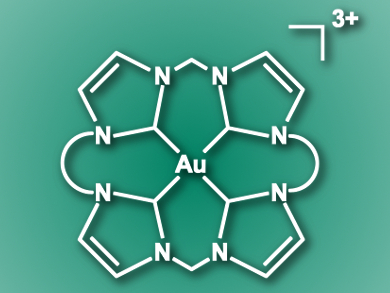Gold complexes have been investigated for use in catalysis and as anti-cancer compounds. N-heterocyclic carbenes (NHCs) are useful ligands for such applications. Most reported gold complexes are gold(I)-based, since gold(III) ions are highly oxidizing and can easily cause side reactions. In addition, most AuIII–NHC complexes have only one or two NHC ligands, with only a single example of an Au(NHC)4-type complex to date.
Murray V. Baker, University of Western Australia, Perth, and colleagues have synthesized six new complexes of the AuIII(NHC)4 type (general structure pictured). The team treated bis- or tetrakis(imidazolium) salts with KAuCl4 and acetate as a base to prepare three different complexes of the type [Au(NHC)4Cl2]Cl. These could be further reacted with KPF6 to give square-planar [Au(NHC)4](PF6)3 complexes.
The reactions proceed in good yields and the [AuIII(NHC)4] groups are remarkably stable for gold(III) complexes. The compounds show no signs of decomposition in 1H-NMR experiments during prolonged heating in DMSO-d6 (deuterated dimethyl sulfoxide) at 120 °C or in D2O at 100 °C.
- Stable AuIII complexes with four N-heterocyclic carbene groups can be prepared in high yield directly from KAuCl4,
Ahmed H. Mageed, Brian W. Skeltona, Murray V. Baker,
Dalton Trans. 2017.
DOI: 10.1039/c7dt01272a




